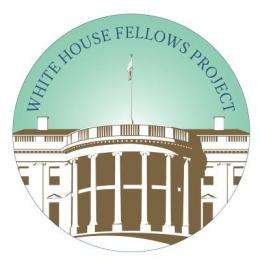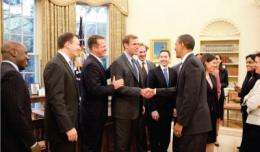New White House Fellows survey: Leaders are less trusting, less cynical

Contemporary leaders are less trusting, but also less cynical, than those in top positions nearly four decades ago, according to a new comprehensive survey of White House Fellows -- a group that includes more than 600 prominent leaders in nearly every sector of American society.
On the eve of the 45th anniversary of the executive order establishing the President's Commission on White House Fellowships, D. Michael Lindsay, Rice University sociology professor and Baker Institute for Public Policy scholar, today released the results from a yearlong study, which resembled the last major survey of America's leadership cohort (the American Leadership Study of 1971-72). Leaders represented in the study include corporate CEOs (of such companies as Levi Strauss & Co. and JCPenney), political leaders (such as presidential cabinet secretaries as well as U.S. senators and representatives), along with top leaders in higher education, nonprofit life and the media.
The report, "Surveying America's Leadership: A Study of White House Fellows," reveals striking differences between America's leadership cohort and the general public as well as differences between leaders today and those of the 1970s. America's leadership cohort has greater confidence than the general public in certain institutions — such as the Supreme Court and the scientific community — and less confidence in others — such as education or organized labor. The study reveals significant differences on hot-button topics such as executive income and political representativeness.
"This study shows some important ways that the federal government is recruiting not only future political leaders, but also training leaders for the private and nonprofit sectors," said Lindsay.

The study was co-sponsored by the James A. Baker III Institute for Public Policy and the Carnegie Corp. of New York. Through its grantmaking, the Carnegie Corporation funded the first few years of the White House Fellowship.
"Leadership has always been one of the highest values at Carnegie Corp. of New York because leaders make a difference in institutions, in peoples' lives and in society," said Vartan Gregorian, president of the Carnegie Corp. and a current member of the commission that annually selects White House Fellows. "When John Gardner, the former president of the Corporation, worked to create the White House Fellowship program he believed the men and women who won these competitive slots in government could make a difference.
"For the first time in 45 years, however, we now have hard data [from Rice University] on how important a role the White House Fellowship can be, not just in the lives of our nation's leaders but also in American society. We are proud the corporation, present at the creation of the fellowship program, could support this important research. Anyone who cares about developing leaders can learn from these findings."
Source: Rice University (news : web)
















